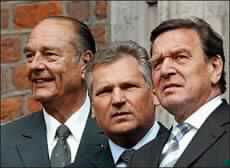- Author:
& Agencies - Section:
WORLD HEADLINES
France Insists UN Should Play "Central Role" in Iraq

French President Jacques Chirac insisted the United Nations must play a "central role" in the reconstruction of Iraq, and promised to play a "constructive" part in talks on a draft UN resolution. He was speaking at a news conference during a three-way summit at which Poland, one of Washington's closest allies in Iraq, and France and Germany, the war's fiercest opponents, moved to heal a deep rift.
"I do not intend to go into details prematurely," Chirac told a joint news conference in Wroclaw in southwestern Poland with Polish President Aleksander Kwasniewski, who hosted the meeting, and German Chancellor Gerhard Schroeder.
"At this stage I confirm France's willingness to broach discussions on the future of Iraq in an open and constructive spirit," he said.
"The objective is the economic and political reconstruction of Iraq and the restoration as quickly as possible of its full sovereignty," he said.
"We remain convinced that in order to reach this objective and to respond to the aspirations of the Iraqi people, and it is the opinion of the vast majority of nations and people around the world, the United Nations should play a central role."
The UN Security Council met Friday for initial discussion of a draft resolution which would lift sanctions against Iraq and put the country's oil-rich economy under US control for one year.
The US-backed draft also proposes cutting the proportion of Iraq's oil sales set aside to compensate Kuwait for a 1990 invasion and comes one month after US tanks rolled into Baghdad and Saddam Hussein 's regime collapsed.
France, and Russia, both anti-war council members, are expected to challenge some of the draft's proposals.
Schroeder also pushed the UN role in post-war Iraq.
"We want to avoid a humanitarian catastrophe in Iraq," the chancellor told the news conference.
"We want to act in Iraq under the auspices of the United Nations," he stressed.
At their summit the three leaders issued a fence-mending statement pledging to deepen cooperation on foreign policy and defence.
In a statement they "agree to intensify consultations ...on the development of foreign policy, security and defence through the commitment to regular tripartite consultations."
"We have clearly affirmed our will to progress together towards a Europe that gives itself the indispensable means of defending itself, with full respect for the Atlantic alliance," Chirac said.
He said that the summit had shown the three countries "are on the same line. We have defined that we have a horizon in common."
The summit took place within the Weimar Triangle, set up as a forum of trilateral dialogue in 1991, the year after German reunification.
Ties in the group came under severe strain, however, when France and Germany reacted with fury to Poland's full-scale backing for the US-led war in Iraq.
Poland's contribution to the Iraq war of 200 troops brought rewards, as Washington charged Warsaw with administering one of four planned military sectors in post-war Iraq.
Kwasniewski said the summit had shown that Poland did not face a conflict in its loyalties with the United States and Europe.
"We have good relations with the United States and our European partners France and Germany. That is Polish policy," he said.
"This meeting has shown that such a policy is possible and efficient."
Poland, set to join the European Union in a year's time, has been anxious to mollify France and Germany, two heavyweight members of the EU bloc.
Several Polish officials have visited Washington this week for talks about the future Iraqi administration.
One of them, Defence Minister Jerzy Smajdzinski, invited Germany to contribute troops to a "stabilisation force" for Iraq.
**PHOTO CAPTION***
French President Jacques Chirac (L to R), Polish President Aleksander Kwasniewski and German Chancellor Gerhard Schroeder, pose for a photo in Wroclaw.(AFP/Patrick Kovarik)


 Home
Home Discover Islam
Discover Islam Quran Recitations
Quran Recitations Lectures
Lectures
 Fatwa
Fatwa Articles
Articles Fiqh
Fiqh E-Books
E-Books Boys & Girls
Boys & Girls  Women
Women









